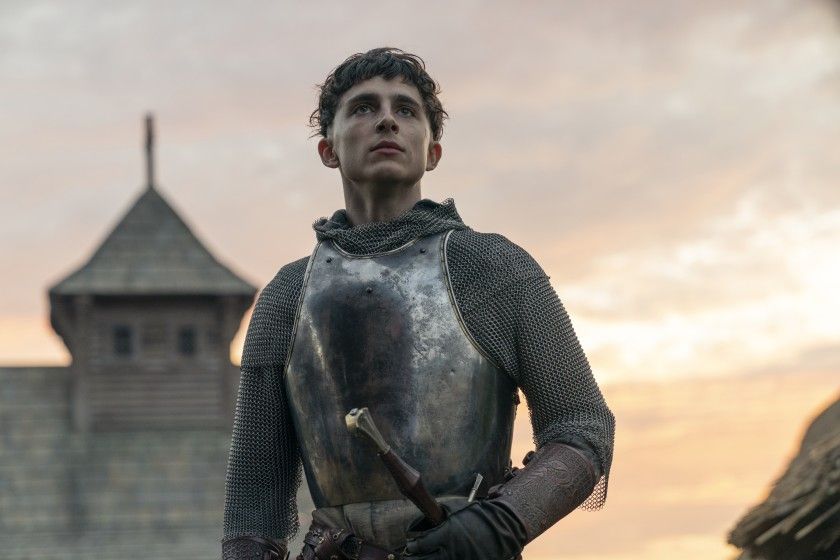Critics Voice
The King – Review by Jane Freebury

The King
MA15+, 140 minutes
Review by © Jane Freebury
4 Stars
Now that the streaming platforms are windows on the world in our shuttered lives, movies that were at the cinema a few months ago are re-appearing on our TVs. Giving The King a second chance if you missed it last October is a good bet.
It’s an Australian film from David Michôd (Animal Kingdom, 2010) that had a short release last year. There were favourable reviews, it did some business at the box office and then it joined the Netflix stable from whence it came.
Like The Irishman and Roma, it is a Netflix production. Much of its budget would have gone into the impressive historical detail, including lavishly mounted battle scenes with full-scale catapults hurling fireballs, and hordes of extras in clanking armour.
Filmed in cathedrals and castles in England and Hungary, The King has an authentic period look that has been handsomely photographed by Australian cinematographer Adam Arkapaw (Top of the Lake, Macbeth). In its stern way, it looks great.
The filmmakers have also invested a great deal in actor Timothée Chalamet in the title role. Only 24 years old and hot property since his leading role in Call Me by Your Name (Luca Guadagnino, 2017), his ambiguously gendered beauty is not what we might expect in a celebrated warrior king, and is a destabilising factor that keep things interesting.
In recent times, it’s been good to see young filmmakers prepared to give Shakespeare a go. Macbeth and Romeo + Juliet, directed by Australians Geoffrey Wright and Baz Luhrmann respectively, each struggled in different ways with the language, but The King is based on a completely new screenplay and I’m happy to say that it works.
Shakespeare’s observations and insights on leadership, power and when to go to war are still there, told in simple and naturalistic language that has considerable power.
Michôd co-wrote his screenplay with actor-director Joel Edgerton, who has the key role of Hal’s constant companion, Falstaff, a dream part for any actor.
Their screenplay is drawn from the three Shakespearean plays, Henry IV (Parts 1 and 2) and Henry V, that trace the career of one of England’s most popular kings. It was Henry V who defeated the French at the Battle of Agincourt, a victory that joined the French and English thrones, for a short time at least.
The uniformly fine cast comprises Australian, American and British actors, some in memorable cameo roles. Ben Mendelsohn appears as Henry IV, the king who will not acknowledging his elder son, Hal, until his dying breath. Robert Pattinson appears in a scene-stealing role as the Dauphin, the vicious, wily heir to the French throne.
Lily-Rose Depp’s appearance as Catherine de Valois is only brief but big on impact.
Chalamet himself is very good as the wayward prince who morphs into a great king, though I have some reservations about casting him in this role.
The King tells a story for modern audiences. It’s quite unlike Henry V starring Laurence Olivier in 1944. While that film was made to revive the war effort, Michôd’s film asks questions about leadership in time of war.
There is nothing glamorous about warfare here. When Prince Hal takes down rebellious young Hotspur (Tom Glyn-Carney), there is nothing valiant about one-on-one combat either. Their swordfight finishes in a grim, desperate wrestling match.
At Agincourt, the French and English armies slog it out in what must have been total mayhem. How would the combatants have known who was who as they struggled in the mud?
Ever since Shakespeare wrote the fictional character of Falstaff into his Henry plays, the king has been in danger of being upstaged by his mischievous, wassailing companion. Edgerton clearly enjoys himself as the bad influence who constantly leads the young prince into trouble.
However, The King has elevated Falstaff’s standing, giving him a role of consequence as a royal adviser. No longer a comic character who keeps Henry in touch with the common man, Falstaff can advise on military strategy too.
All these changes risk upsetting the purists around the Anglosphere, but The King is nothing if not bold.
Kings and kingship are not in themselves such a fashionable subject for audiences today, but the question of good leadership and how to govern is as relevant today as it has always been, and will not go away.
